Disclosure: Sportshubnet is supported by its audience. When you purchase through links on our site, we may earn an affiliate commission. Learn More.
In this post, we will check out how to do keyword research for your WordPress blog.
Keyword research is a crucial step for any blogger who wants to attract more traffic to their website.
By conducting research on the keywords people use to search for information related to their niche, bloggers can optimize their content for search engines and increase their chances of appearing at the top of search results.
If you have a WordPress blog and you want to improve your visibility and attract more visitors, keyword research is an essential strategy to help you achieve your goals.
In this article, we’ll discuss some tips and techniques for conducting keyword research for your WordPress blog, so you can create content that is more relevant, useful, and engaging to your target audience.
Whether you’re a beginner blogger or an experienced content creator, these tips will help you optimize your blog and drive more traffic to your website.
Table of contents
What is Keyword Research?
Keyword research is a crucial component of search engine optimization (SEO) and content marketing. It involves identifying and analyzing the specific words and phrases that people use when searching for information, products, or services online.
The goal of keyword research is to gain a better understanding of what your target audience is looking for and to create content that matches their search queries.
Keyword research typically begins with brainstorming a list of potential keywords and phrases that are relevant to your business or industry.
This can be done using tools such as Google’s Keyword Planner, which provides data on search volume, competition, and cost-per-click for various keywords.
Once you have a list of potential keywords, you can then use various metrics to determine which ones are most valuable to your business.
One important metric is search volume, which refers to the number of times a particular keyword is searched for on search engines like Google each month.
Ideally, you want to target keywords with high search volume, as this indicates that there is a significant amount of demand for content related to that keyword. However, you also need to consider the level of competition for each keyword, as targeting highly competitive keywords may be difficult and time-consuming.
Another important metric is relevance, which refers to how closely a particular keyword matches the content on your website or blog.
It’s important to target keywords that are highly relevant to your content, as this will help improve your search engine rankings and attract more targeted traffic to your site.
Ultimately, keyword research is an ongoing process that involves continuous analysis and refinement.
By identifying the most valuable keywords and optimizing your content around them, you can improve your search engine rankings, drive more traffic to your site, and ultimately achieve your business goals.
Why is keyword research important?
Keyword research is important because it helps businesses understand what their target audience is searching for online.
By identifying the specific words and phrases that people are using to find information related to your business, you can optimize your website and content to better match their search queries.
This can help improve your search engine rankings, drive more targeted traffic to your site, and ultimately increase conversions and revenue.
Keyword research can also help businesses identify new opportunities for growth and expansion. By analyzing search trends and identifying emerging keywords and topics, businesses can stay ahead of the competition and position themselves as thought leaders in their industry.
This can help attract more organic traffic to their site, increase brand awareness, and ultimately drive more sales and revenue.
Another benefit of keyword research is that it can help businesses save time and money on advertising. By targeting the most valuable and relevant keywords, businesses can optimize their ad campaigns to reach the right audience and maximize their return on investment. This can help reduce ad spend and improve overall campaign performance.
Overall, keyword research is a critical component of any successful SEO and content marketing strategy. By understanding what your target audience is searching for and optimizing your content around those keywords, you can improve your visibility, attract more targeted traffic, and ultimately achieve your business goals.
Elements of Keyword Research
Keyword research is one of the most important steps in any SEO campaign. Without the right keywords, it’s impossible to optimize your website for search engines or create content that will interest your audience.
There are many different ways to conduct keyword research, but we’ve found that there are a few key elements that must be considered. These include:
Keyword Research Goals – Before you start any kind of keyword research, it’s important to understand what your goals are. Are you trying to rank for a certain keyword? Are you trying to optimize for long-tail terms? Are you simply trying to determine what people are searching for? Whatever your goal may be, it will help guide your research and give you better results if you stay true to it throughout the process.
Keyword Competition – Keyword competition is an important factor when choosing which keywords your website should target. If a keyword has a low level of competition (such as “puppies”), it means that there are fewer websites competing for that term than there would be if Google had more results returned when someone searched for “puppies.” However, even if a keyword has low competition doesn’t mean that it’s going to be easy to rank
In this post, we have hand-picked some of the best keyword research tools that we have personally used for our own website. We will explore each tool and how it can help you to conduct keyword research.
How to Do Keyword Research for Your WordPress Blog?
1 Semrush

Semrush is one of the best SEO Tools on the market. It is a complete SEO tool to carry out keyword research and improve your SEO rankings.
It provides data for organic search engine results on Google, Bing, Yahoo!, YouTube, Amazon, and more.
To get started, simply go to the Semrush website. Then type a keyword into the ‘Enter domain, URL or keyword’
Just come with the keyword that you have in mind, then you can use any word or phrase related to your business.
Let’s go with the keyword “best SEO tools”. Once you click on search, Semrush will start displaying lots of information about that keyword.
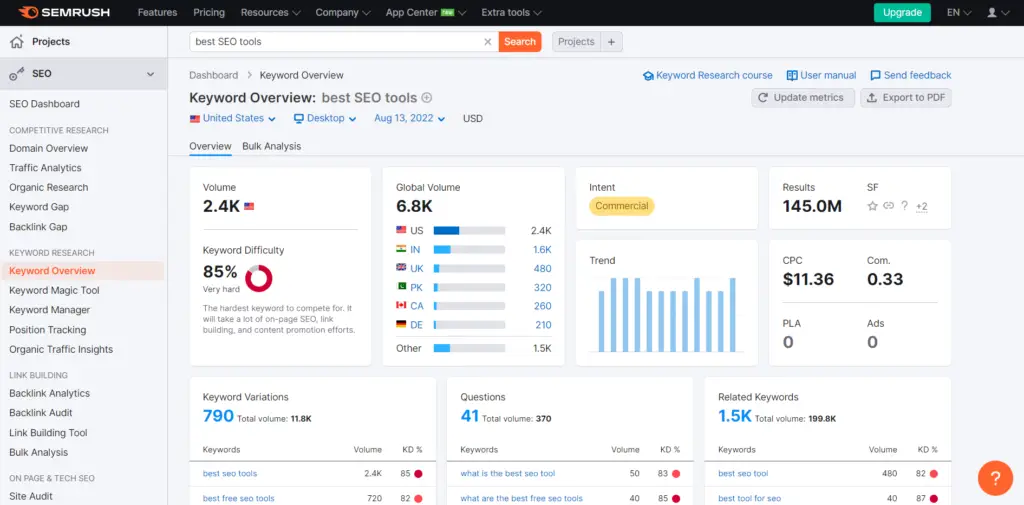
This includes volume, keyword difficulty, global volume, intent, CPC, keyword variation, questions, and related keywords.
Related keywords are search terms that you must include in your content with the seed keyword provided. It makes the user experience better and improves your SEO score in the eyes of Google.
Adding lots of related keywords in your content in SEO best practices and making your content more detailed and genuine. I also recommend you to keep your distance from keyword stuffing as it may lower your rankings.
To see the full list of related keywords, click on the ‘View all…’ button.
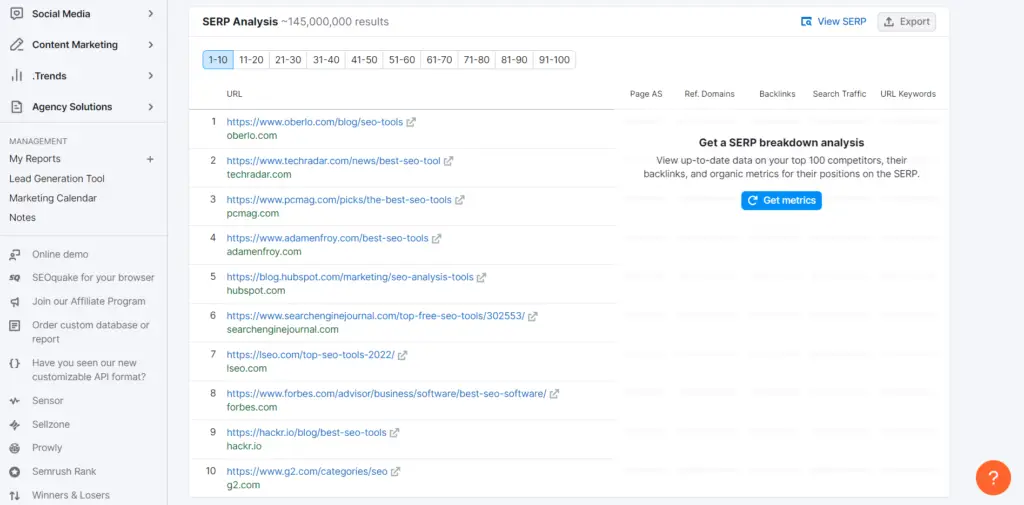
Next, go down to the SERP Analysis section. The SERP Analysis section shows the index of top search results for the entered keyword.
If you really want to rank then these sites are the roadblock and you have to tackle them. To view an elaborate Report for each result, simply click on its URL.
By studying this report, you can nicely understand why this page ranks so positively for this specific keyword.
To see a precise analysis, click on the links that are already ranking on the top search results.
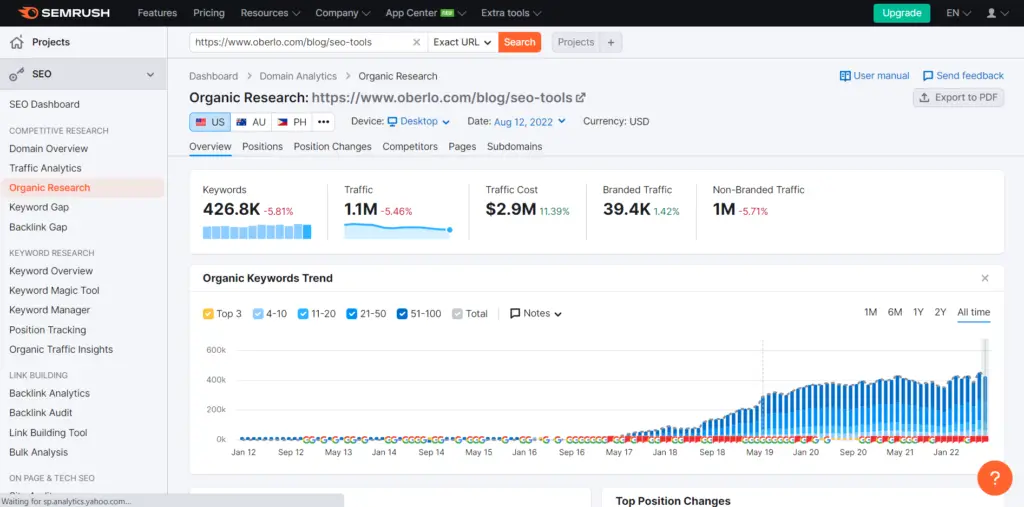
You can also see the details like organic keyword trends, backlinks for that URL, the top keywords they rank for, position changes, and other valuable info. Overall, Semrush is one of the best keyword research tools to conduct keyword research.
2 KWFinder

KWFinder is a tool developed by Mangools – a creator known for providing the best keyword research tools across types.
To get started go to the website of KWFinder. you can sign up for a 10-day free trial, limited to 5 lookups per 24 hours and 25 related and 10 competitor keywords per lookup.
To unlock more searches, you’ll need to upgrade to one of the paid plans. With KWFinder keyword research you will get a ton of data about the keyword, simply just enter your query into the search box.
Enter your keyword, select a specific language, and even choose the results for a particular country or city.
Once you enter your keyword and select the location and language, click “Analyze” and all your results will show up with detailed insights.

The tool will come up with questions, related keywords, and data of specific keywords which includes search volume, CPC, and difficulty.
You’ll also see SERP results with some useful SEO metrics on the right side.SERP results will show you the domain authority, page authority and total backlinks the page gets.
These are very valuable data when it comes to keyword research. You can surely go with this tool as it provided detailed statistics of a given keyword.
3 Ahrefs

Ahrefs is another popular keyword research tool that delivers identical features to SEMrush. It lets you do research on your own site, the competition, and the search volume for an offered term or phrase.
The data provided by Ahrefs can be used for blog posts, articles, content marketing, and much more.
You also have the option to do the competitor’s analysis to grow your blog to the fullest. Competitor analysis helps you find referring domains, backlinks, organic keywords, and competitors’ most popular content.
One of the best things to explore in Ahrefs is ‘Organic Keywords.’ This will display a list of keywords for the domain name along with search volume, search rank, URL, and more. Check out the details of our site in the below image:-
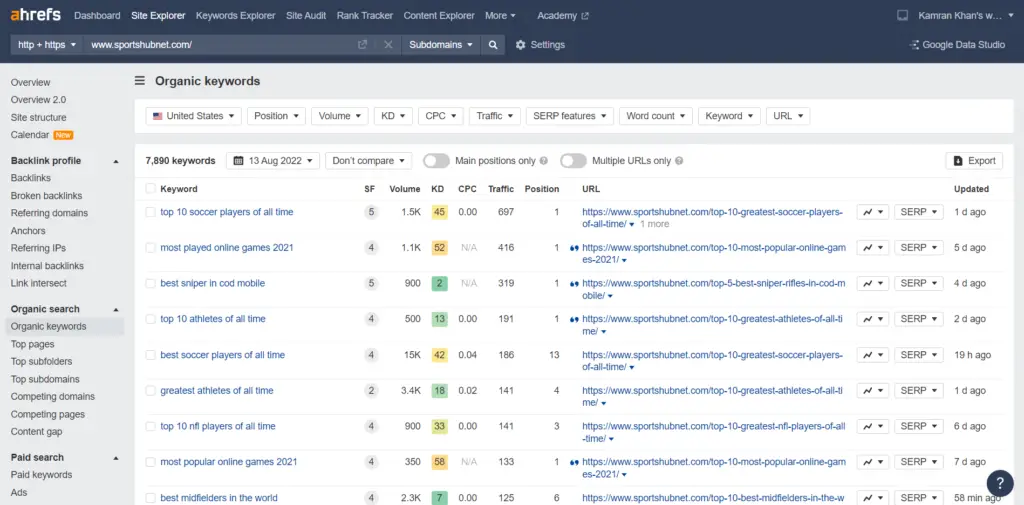
If you want to forge some keyword ideas, then straight go to the keyword explorer and type words into the search box.
Ahrefs’ keyword explorer tool will then yield a ton of keyword suggestions, along with their search volume, difficulty score, CPC, and position. We suggest looking for keywords that have a high search volume, and a lower difficulty score.
Overall, I recommend using Ahrefs as it offers unique insights into SEO performance. Additionally, this tool lets you track keywords over time which is extremely helpful when developing an SEO strategy.
4 Serpstat
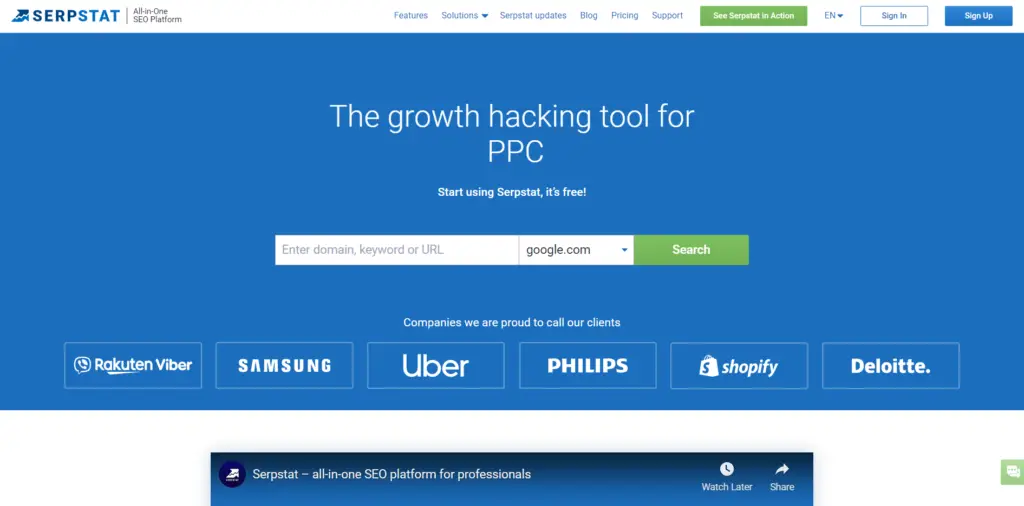
If you’re digging for a complete SEO tool, Serpstat is an ideal option that combines website analytics, keyword research tools, SERP analysis, backlink analysis, a rank tracker, and website audit features.
What’s more, the service also o provides link-building features and other tools to help you increase your search rankings on Google.
To get started go to the website of Serpstat and search the terms in the keyword research section and then click on keyword selection.
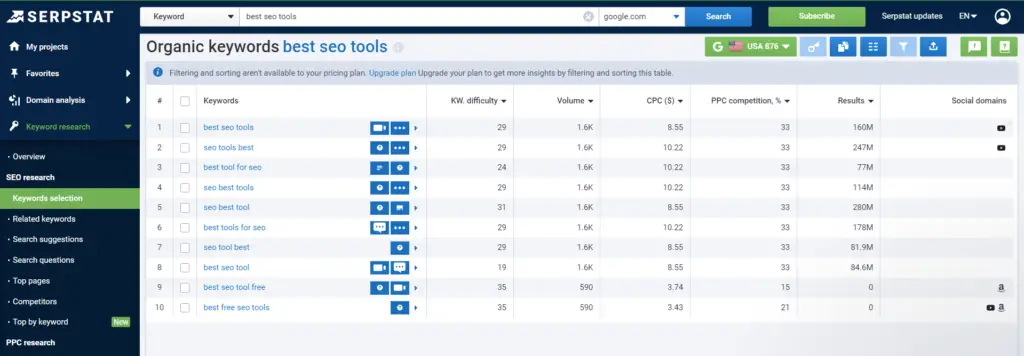
Once you type the keyword you will find all the variations of search queries that contain the given keyword.
Serpstat helps you to give the data which includes keyword difficult, volume, and CPC. Serpstat is surely one of the best when it comes to the complete suite of SEO tools.
Here are some Keyword Research Tips:-
Understand keyword research
Keywords are the words that people type into search engines when they’re looking for information. Keyword research is a process of finding those terms and understanding what people are searching for.
It is also an important part of SEO (Search Engine Optimization), which is the practice of making your website more visible to relevant users so that it has a better chance of being found on Google and other search engines.
Keyword research helps you find out what people are interested in or looking for online, so you can create content that addresses their needs and interests—and get them to come back again!
Choose a primary keyword
The first step in keyword research is to choose a primary keyword. This is the key phrase that you want to target with your content.
The next thing you want to do is come up with two or three related keywords. You can do this by looking at other sites in your niche and seeing what they are targeting, or by looking at how your competitors are using keywords on their blog posts (you can do this using Semrush).
Determine the search volume of your keyword
Your next step is to determine the search volume of your keyword.
Here are some tools you can use:
- SEMrush
- KWFinder
- Ahrefs
- Serpstat
- Moz Keyword Explorer
- Keyword Tool.IO
- Ubersuggest
Identify secondary keywords
Secondary keywords are a great way to get an idea of the theme, tone, and style of your post. If your primary keyword is “organic dog food” then secondary keywords could be “healthy dog food,” “natural dog food,” or even “best organic dog food.” These secondary keywords can tell you what type of posts you should write on this topic and make it easier for people searching for similar topics to find your article.
Use keywords in your post
- Use keywords in your post title.
- Use keywords in your post meta description.
- Use keywords in your post content.
- Use keywords in your post URL, which is the address of the page that visitors see when they click on a link to get there (like this one).
- Add keyword-rich alt-text descriptions to each image you upload on your blog posts so search engines can see what’s going on with these images and include them in their indexing efforts for related searches. It must contain no more than two sentences per image, but do make sure they’re descriptive enough so that anyone who sees them will understand what they represent!
Optimize your WordPress blog for SEO
Optimizing your WordPress blog for search engines is a great way to get more traffic. In this section, you’ll learn how to do keyword research, optimize your blog for SEO, and analyze the competition.
- Do keyword research. When you start writing posts on your WordPress blog, it’s essential that you keep in mind what keywords people are searching for when they visit blogs like yours. Keyword research allows you to find out what those keywords are and use them when creating content for your site.
- Use tags and categories wisely. Tags help readers discover new content related to their interests by allowing them to filter their searches based on those topics or themes (e.g., “dogs”). Categories group similar posts together so that readers can see which ones cover similar topics (e.g., “dog training”). Both tags and categories allow Google bots crawling through web pages easier ways of finding relevant information about specific subjects online than simply looking at every single word contained within each document individually would provide—which means they can better determine whether something might be worth indexing into its database before doing so!
How to Apply Keyword Research in Your Business or Blog?
Keyword research is a way to find out what people are searching for so that you can create content that will attract them. It’s especially important for businesses, as it helps them understand what their customers want to buy.
If you run a business or blog, here are some tips on how to apply keyword research in your business:
- Conduct a keyword search on Google and look at the related searches at the bottom of the page. These are keywords people are using when they search for something similar to what you offer.
- Use Semrush to find popular keywords that people use when searching for products or services like yours.
- Use KWFinder (or another tool) to discover long-tail keyword phrases that people use when searching for things similar to yours — but with more specific details added (e.g., “how much does it cost?”). These are less competitive than broad terms but still relevant to what you do and therefore great places to start building content around!
Before you can start optimizing your blog for search engines and readers, you need to know the keywords people are searching for. A keyword is a word or phrase used to represent what someone is looking for on the internet.
A good way to get started with keyword research is by thinking about what kind of content you want to create and then choosing words that describe it. For example, if I want to write a post about how I started my business as an online marketer back in 2022, I might use the phrase “how I started my online marketing business.” This phrase contains two keywords: “how” and “online marketing,” which would help me identify relevant topics (and potential posts) in my niche of SEO.
Conclusion
Keyword research is an important part of optimizing your blog posts for search engines and readers. If you’re new to SEO or want a refresher on keyword research, we hope this guide has been helpful!
Inbox looking a bit bland?
Better sign up to our blog to cram it full of trending Sports, Gaming & Tech updates.




